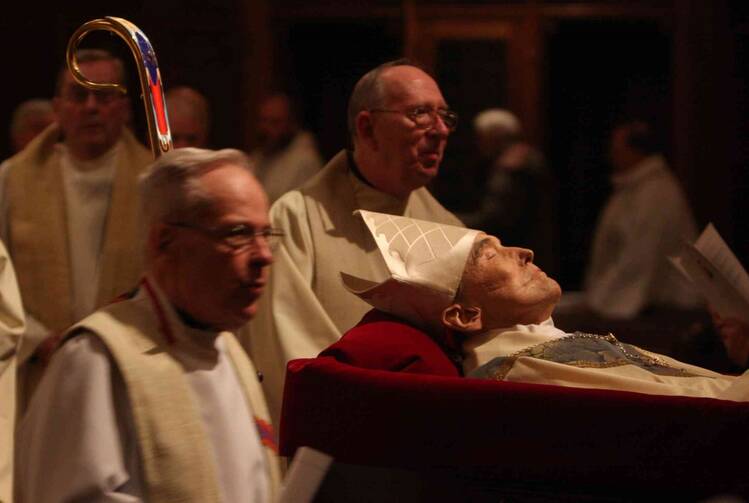Today, toward the end of the funeral Mass for Avery Dulles at Saint Patrick’s Cathedral, after the long procession of priests had filed out the front doors onto Fifth Avenue, followed at last by Cardinal Egan, there was then a hushed pause. A beat or two of empty time, and then suddenly from near the altar, twenty rows ahead of me—vigorous clapping, and Cardinal Dulles’ casket breaking the horizon. Held aloft by a team of suited pallbearers and bobbing slightly down the center aisle, it blew slowly like a skiff down a shallow stream. The small crucifix flat and precarious atop the casket, some kind of sail, compass, or maybe a rudder to guide his body out of the church.
Out of the church? The irreversibility of that skiff’s float out of Saint Patrick’s bellowed in from all sides. What does it mean for this theologian’s body to make its last passage out of church, to have it so irremediably measured in those very footsteps toward the door?
He will never need this church in this way, again. What, I wanted to know, is the kind of theological life that will now show us how to live ecclesially in face of this final-closing-of-the-church-doors-behind-us? And what spiritual pressures do all the other exits out of church life today, whether forced or chosen, have to teach us about being ecclesial in face of that final recessional?
Avery Dulles, pray for us.
Tom Beaudoin
Hastings-on-Hudson, New York
Cardinal Dulles’ Funeral: A Brief Theological Note
More: Cardinal Avery Dulles
Show Comments (
)
Comments are automatically closed two weeks after an article's initial publication. See our comments policy for more.
The latest from america
Los Angeles Archbishop José H. Gomez was one of several community leaders who joined to open the Family Assistance Program, aiding those affected by recent ICE raids.
On Friday, Pope Leo XIV issued a statement on the theme "Migrants, missionaries of hope."
In Steven Spielberg’s “Close Encounters of the Third Kind,” an ordinary electrician has a transcendent encounter—with U.F.O.s, not God.
Many of my acquaintances have given up “reading about something that didn't happen.” But fiction has long-term and concrete value, both mentally and socially.








